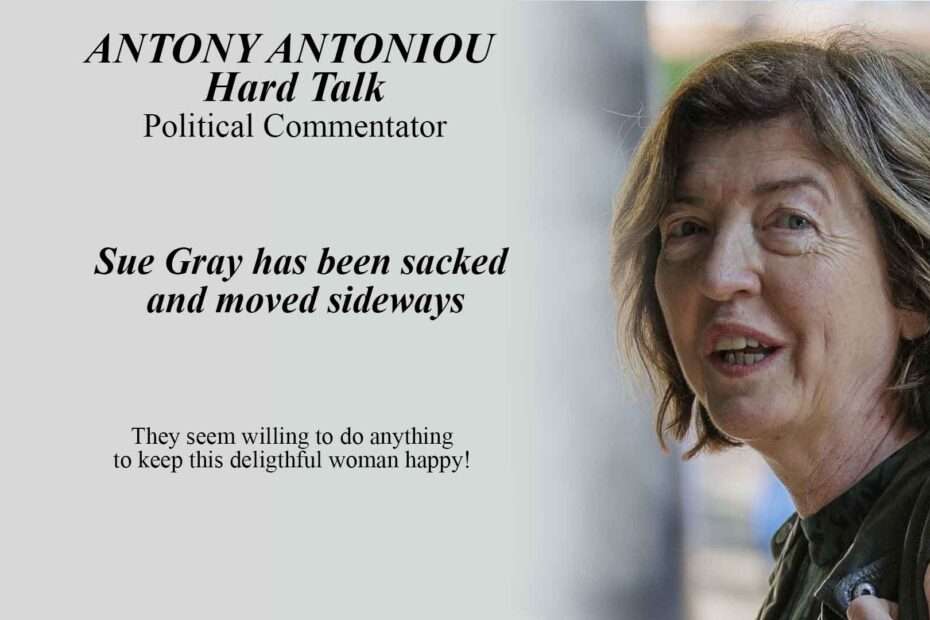Sue Gray has been sacked and moved sideways to keep her quiet
Sue Gray, the erstwhile chief of staff to Sir Keir Starmer, has tendered her resignation from her position, citing concerns that she was at risk of becoming a distraction to the Labour Party’s agenda. This development comes after a tumultuous three-month tenure in the corridors of power at Number 10 Downing Street.
Ms Gray, a former high-ranking civil servant with a reputation for impartiality and thoroughness, has accepted a new role as the Prime Minister’s envoy for the regions and nations of the United Kingdom. This move marks a significant shift in her career trajectory, transitioning from a party-political role to one that ostensibly serves the broader interests of the nation.
The announcement of her departure has sent ripples through the political establishment, with many speculating about the underlying reasons for her decision. Ms Gray’s tenure as chief of staff had been marred by a series of hostile briefings from rival Labour figures, who expressed concerns about the extent of her influence over the operations of Number 10. These anonymous sources suggested that Ms Gray wielded an inordinate amount of power, potentially overshadowing other key figures within the party hierarchy.
Adding fuel to the fire of controversy, details of Ms Gray’s salary were leaked to the press, revealing that she earned £3,000 more than Sir Keir Starmer himself. This disclosure raised eyebrows and prompted questions about the appropriateness of such a remuneration package for a non-elected official.
In a carefully worded statement, Ms Gray addressed the circumstances surrounding her resignation. She said, “After spearheading the Labour Party’s preparations for government and initiating work on our programme for change, I am looking forward to drawing upon my extensive experience to support the Prime Minister and the Cabinet in their efforts to deliver the government’s objectives across the nations and regions of the United Kingdom.”
Ms Gray went on to emphasise her long-standing commitment to public service, stating, “Throughout my career, my primary interest has always been in serving the public. However, in recent weeks, it has become increasingly apparent to me that the intense scrutiny and commentary surrounding my position risked becoming a significant distraction from the government’s vital work of implementing change.”
She continued, “It is for this reason that I have made the difficult decision to stand aside. Nevertheless, I eagerly anticipate continuing to support the Prime Minister in my new role as envoy for the regions and nations.”
The departure of Ms Gray marks the end of a brief but impactful chapter in Labour Party politics. Her appointment as chief of staff had been seen as a coup for Sir Keir Starmer, given her reputation for competence and her intimate knowledge of the inner workings of Whitehall. However, her presence also raised questions about the blurring of lines between civil service impartiality and party-political roles.
Sir Keir Starmer, in response to Ms Gray’s resignation, issued a statement expressing his gratitude for her contributions. He said, “I wish to extend my heartfelt thanks to Sue for all the invaluable support she has provided to me, both during our time in opposition and now in government. Her work in preparing us for the responsibilities of governance and in getting our programme of change off the ground has been invaluable.”
The Labour leader went on to highlight Ms Gray’s achievements in her role, particularly in the realm of intergovernmental relations. “Sue has played a pivotal role in strengthening our relationships with the regions and nations of the United Kingdom. I am delighted that she will continue to lend her expertise to this crucial area of work in her new capacity.”
Ms Gray will be succeeded in her role as chief of staff by Morgan McSweeney, a long-time Labour Party operative with extensive experience in campaign management and political strategy. Mr McSweeney’s appointment is seen as a move to bring a more traditional party-political approach to the role, potentially allaying concerns from some quarters about the influence of former civil servants in Labour’s inner circle.
The transition comes at a critical juncture for the Labour government, as it seeks to implement its ambitious programme for change while navigating the complex political landscape of post-Brexit Britain. Ms Gray’s new role as envoy for the regions and nations is likely to be crucial in this regard, as the government seeks to address concerns about regional inequality and devolution.
As the dust settles on this latest shake-up in Downing Street, political observers will be keenly watching to see how these changes impact the direction and effectiveness of Sir Keir Starmer’s administration. The coming weeks and months will undoubtedly provide insight into whether this reshuffle will help to refocus the government’s efforts on its core priorities or whether it signals deeper divisions within the Labour Party’s power structures.

